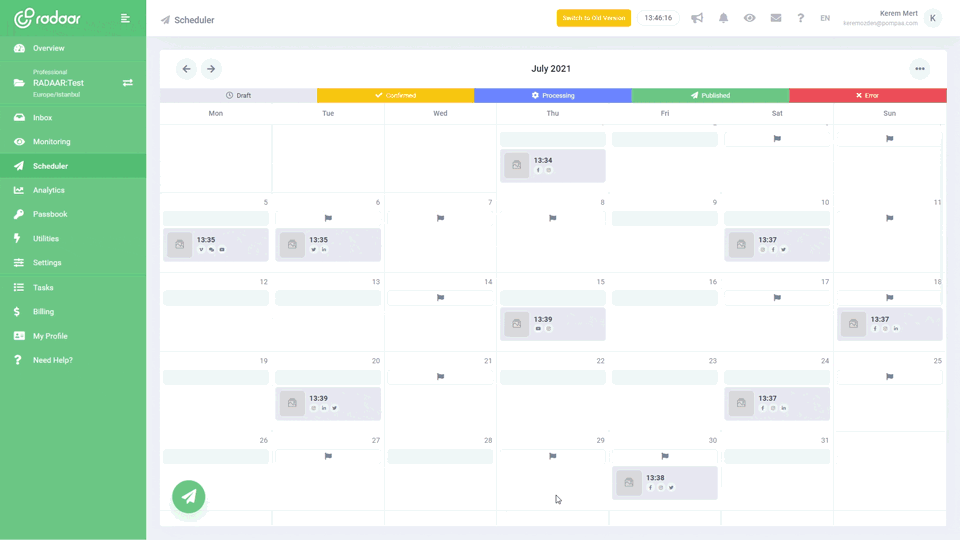How did one agency CEO overcome a culture crisis and turn retention nightmares into a thriving workplace everyone wants to join?
Discover how one agency CEO confronted a culture crisis, overhauled retention strategies, and built a workplace where top talent thrives. Read on to unlock actionable lessons for transforming your own agency culture.
LEARN MORE LAUNCH DEMO NOW Employee turnover is one of the most painful and expensive challenges any agency owner can face. Watching skilled team members leave, seeing client trust erode, and feeling trapped in a relentless cycle of hiring and training can make sustainable growth seem like a distant dream. For New Jersey agency CEO Joe Giovannoli, these very struggles became a wake-up call—forcing him to confront the root causes of his retention nightmare. What he discovered was that fixing culture was not just about perks or higher pay, but about building true employee connection, transparency, and a sense of purpose.
In this post, you’ll learn how Joe transformed his agency’s culture from the inside out—using candid employee feedback, investing in people-first policies, and implementing practical systems for accountability and growth. You’ll get actionable insights on how to identify what really matters to your team, measure progress, and translate values into daily practices that elevate both staff well-being and client satisfaction. If your agency is struggling with retention or seeking a stronger culture, Joe’s journey reveals the proven tactics any leader can use to make their team—and business—thrive.
In this post, you’ll learn how Joe transformed his agency’s culture from the inside out—using candid employee feedback, investing in people-first policies, and implementing practical systems for accountability and growth. You’ll get actionable insights on how to identify what really matters to your team, measure progress, and translate values into daily practices that elevate both staff well-being and client satisfaction. If your agency is struggling with retention or seeking a stronger culture, Joe’s journey reveals the proven tactics any leader can use to make their team—and business—thrive.
Table of Contents
- What truly causes agency employees to walk away?
- Are better benefits and compensation really enough incentives?
- How can honest feedback reshape your workplace culture?
- In what ways do values guide daily employee actions?
- How do hiring and offboarding reflect company culture?
- What is the impact of slow, intentional hiring processes?
- How does exceptional culture influence your client experience?
- Why is cultural transformation a long-term investment effort?
- Can investing in culture make agencies irresistible to talent?
What truly causes agency employees to walk away?
Agency turnover is rarely about just salary—employee departures often stem from deeper cultural issues that go unaddressed. While compensation matters, many agency professionals leave because they feel undervalued, unsupported, or overwhelmed by unrealistic workloads. Lack of transparent communication, unclear advancement paths, and a high-stress environment can quickly erode loyalty and morale. When team members aren’t emotionally invested or can’t see a future with the company, they are much more likely to seek opportunities elsewhere.
Additionally, a transactional workplace culture—where employees are treated like resources rather than valued contributors—exacerbates retention problems. Agencies that don’t actively listen to and act on employee feedback miss critical chances to improve job satisfaction. Without a sense of purpose, recognition, and work-life balance, even the most talented staff may feel compelled to walk away. Addressing these underlying causes is crucial for transforming a revolving-door agency into a thriving workplace people are eager to join.
Additionally, a transactional workplace culture—where employees are treated like resources rather than valued contributors—exacerbates retention problems. Agencies that don’t actively listen to and act on employee feedback miss critical chances to improve job satisfaction. Without a sense of purpose, recognition, and work-life balance, even the most talented staff may feel compelled to walk away. Addressing these underlying causes is crucial for transforming a revolving-door agency into a thriving workplace people are eager to join.
Are better benefits and compensation really enough incentives?
When agency leaders face high turnover, it’s easy to assume that boosting benefits and compensation packages will solve the problem. While competitive pay and attractive perks are important for retaining top talent, countless case studies show that financial incentives alone rarely create lasting loyalty. Employees may stay for a while, but if the workplace lacks purpose, support, or growth opportunities, turnover problems often persist. Sustainable employee retention requires a deeper commitment to creating a positive workplace culture where people feel truly valued.
The real key to overcoming a culture crisis is to go beyond the basics of salary and healthcare benefits. Thriving workplaces are built on transparency, respect, open communication, and a shared sense of mission. When teams are empowered, heard, and aligned with company values, they are far more likely to stay engaged and loyal. In today’s competitive agency landscape, it’s the organizations that invest in culture—not just compensation—that attract and keep the best people for the long run.
The real key to overcoming a culture crisis is to go beyond the basics of salary and healthcare benefits. Thriving workplaces are built on transparency, respect, open communication, and a shared sense of mission. When teams are empowered, heard, and aligned with company values, they are far more likely to stay engaged and loyal. In today’s competitive agency landscape, it’s the organizations that invest in culture—not just compensation—that attract and keep the best people for the long run.
How can honest feedback reshape your workplace culture?
Honest feedback in the workplace fuels a transparent company culture, giving employees a voice and driving real change. When leaders actively listen and act on team input, trust grows and collaboration thrives. Agencies that embrace open communication reduce misunderstandings, lower turnover, and attract top talent. Creating a feedback-driven environment is key to transforming agency culture and achieving sustainable growth.
In what ways do values guide daily employee actions?
Core values serve as a compass, shaping how employees approach decisions and collaborate with their peers each day. When employees clearly understand and align with company values, they are empowered to act with confidence and integrity, even in challenging situations. This alignment fosters a sense of ownership, accountability, and pride in their contributions to the workplace. As a result, a strong values-driven culture not only guides actions but also boosts team morale and retention.
How do hiring and offboarding reflect company culture?
Hiring and offboarding are powerful indicators of a company’s true culture. The way organizations welcome new talent and respectfully support departing employees reveals their values in action. Transparent communication, empathy, and care during these key transitions foster loyalty and trust. Agencies that prioritize a positive hiring and offboarding experience often achieve higher retention and attract top talent.
What is the impact of slow, intentional hiring processes?
A slow, intentional hiring process can have a profound impact on agency culture and retention rates. By taking the time to thoroughly evaluate candidates for both skills and cultural fit, agencies significantly reduce the risk of quick turnover and mismatches. This approach ensures that every new team member aligns with core values, contributes positively to the environment, and is more likely to stay for the long term. Additionally, a multi-step hiring process often includes real-world assessments, team interviews, and personality evaluations, all of which increase the likelihood of making the right hire.
Not only does this careful approach save costs associated with frequent rehiring and retraining, but it also bolsters team morale and client satisfaction. Employees feel secure and valued when surrounded by committed, like-minded colleagues. As a result, agencies experience fewer disruptions in service delivery and stronger internal bonds. Ultimately, slow hiring leads to a more cohesive, thriving workplace that attracts top talent and transforms retention nightmares into recruitment success stories.
Not only does this careful approach save costs associated with frequent rehiring and retraining, but it also bolsters team morale and client satisfaction. Employees feel secure and valued when surrounded by committed, like-minded colleagues. As a result, agencies experience fewer disruptions in service delivery and stronger internal bonds. Ultimately, slow hiring leads to a more cohesive, thriving workplace that attracts top talent and transforms retention nightmares into recruitment success stories.
How does exceptional culture influence your client experience?
Exceptional workplace culture directly shapes your client experience by fostering happier, more engaged teams. When employees feel valued and supported, they deliver higher-quality service and build lasting client relationships. A thriving agency culture leads to increased client satisfaction, loyalty, and impressive retention rates. Investing in your team’s well-being is the first step to creating a client experience that stands out in today’s competitive market.
Why is cultural transformation a long-term investment effort?
Cultural transformation is a long-term investment because genuine change takes time, consistency, and commitment from leadership. Sustainable workplace culture isn’t built overnight; it requires ongoing trust-building, feedback loops, and continuous improvement. As employees experience stability and see values embodied daily, engagement and retention rates rise organically. Ultimately, investing in culture delivers long-lasting benefits for both talent retention and company growth.
Can investing in culture make agencies irresistible to talent?
Investing in agency culture isn't just a buzzword—it's the foundation that attracts top talent and makes people want to stay. As we've seen through Joe Giovannoli's journey at 9Sail, listening to your team, offering meaningful benefits, and fostering an environment of trust and transparency yield measurable results. When agencies treat their people as their competitive advantage, turnover drops, morale soars, and even client relationships improve. It's clear that when culture comes first, your agency becomes a place where everyone wants to work.
If you’re wondering whether dedicating resources to culture is worth it, the evidence is compelling. Agencies that focus on values, open communication, and employee wellbeing consistently outperform those that don’t. The path might require time and investment, but the return—in employee loyalty, productivity, and client satisfaction—is substantial. Embrace these lessons and start building a thriving workplace that stands out to the best in the business.
If you’re wondering whether dedicating resources to culture is worth it, the evidence is compelling. Agencies that focus on values, open communication, and employee wellbeing consistently outperform those that don’t. The path might require time and investment, but the return—in employee loyalty, productivity, and client satisfaction—is substantial. Embrace these lessons and start building a thriving workplace that stands out to the best in the business.
SOCIAL MEDIA SCHEDULER
Plan and publish...
Plan and publish your content for Facebook, Instagram, Twitter, and LinkedIn from one simple dashboard.
LEARN MORE FREQUENTLY ASKED QUESTIONS
How did one CEO fix culture crisis?
Discover proven answers to agency culture and retention challenges in our FAQ section below. Get expert insights into how real leadership can transform workplace culture and employee happiness.
RELATED BLOG POSTS
All the tips & tricks you'll need...
Get the fresh tips and tricks you'll need to ace social media marketing.











